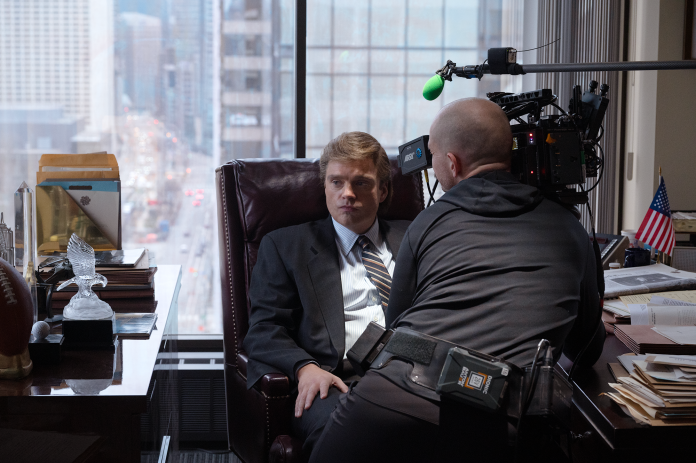On the night of May 20, I stood in my tuxedo inside the storied Auditorium Louis Lumière at Cannes and listened as more than 2,000 people in black tie gave an eight-minute standing ovation for the film I wrote: The Apprentice. The movie is a Frankenstein origin story about Donald Trump, played by Marvel star Sebastian Stan in heavy prosthetics and a golden toupee. It follows Trump as he rises in Manhattan real estate during the gritty 1970s and gaudy ’80s under the tutelage of right-wing lawyer turned fixer Roy Cohn, played with dead-eyed menace by Succession’s Jeremy Strong. The biggest controversy centered on a scene—spoiler alert—that depicted Trump sexually assaulting his first wife, Ivana. (There were audible gasps in the room when it played.) Other scenes showed Trump getting liposuction, undergoing scalp reduction surgery, and popping amphetamine diet pills—details reported in Harry Hurt III’s 1993 Trump biography, Lost Tycoon. (Trump denied the claims at the time.)
The premiere generated headlines worldwide. But during the after-party with views of oligarch-owned yachts anchored in the harbor, I began getting news alerts on my phone: Trump announced he planned to sue to block the movie’s release. “We will be filing a lawsuit to address the blatantly false assertions from these pretend filmmakers,” Trump campaign spokesperson Steven Cheung said. He called the movie “malicious defamation,” “election interference by Hollywood elites,” and said it belonged “in a dumpster fire.” I felt a pit in my stomach as I scrolled the headlines. But I also felt strangely validated. Life was imitating art. Trump’s legal threat followed the first rule Cohn elucidates in the movie: Attack, attack, attack.
Roy Cohn (left) and Donald Trump attend the Trump Tower opening, October 1983 in New York City.Getty Images.
Two days later, Trump’s lawyers sent the film’s director Ali Abbasi and me cease-and-desist letters. The legal document sounded like an outtake from an unhinged Trump rally speech: “I demand that you immediately cease and desist distribution and marketing in the United States of the foreign-funded and directed hit piece masquerading as a movie.” It warned Hollywood companies against distributing the movie domestically: “Any person in the United States providing services, including marketing services, publicity, legal services, and public distribution of the movie, must be mindful of the restrictions of the Foreign Agents Registration Act.”
I hoped the controversy would translate into a deal. Studios and streamers normally compete fiercely to acquire the buzziest titles at Cannes. Two days after our premiere, Netflix reportedly paid approximately $12 million to acquire Emilia Pérez, the genre-bending transgender drug-cartel musical that won the festival’s Jury Prize.
But the specter of Trump’s lawsuit had a chilling effect on would-be buyers. By the time I flew home a week later, no Hollywood company had made an offer to release the movie in the United States.
In the spring of 2017, millions of Americans were processing the upside-down reality that Trump occupied the White House. Some turned to therapy. Others booze. I coped by writing a screenplay. I had been thinking and writing about Trump for 15 years. My first journalism job was reporting on Manhattan real estate for the weekly New York Observer. So you can imagine my shock years later when I found myself covering Trump’s first presidential campaign for New York magazine. Longtime Trump associates like Roger Stone told me Trump was winning because he followed his mentor Cohn’s three rules: Attack, attack, attack. Deny everything, admit nothing. And always claim victory. The insight sparked the idea to write a fictional film about Cohn molding his apprentice into the orange-tanned demagogue he is today.
I discovered their relationship had the elements of a Shakespearean drama. Desperate to outshine his provincial father, Trump sold his soul to Cohn in order to learn Cohn’s dark arts. Cohn’s mentorship fueled Trump’s rise to the pinnacle of New York society. But instead of showing gratitude, Trump virtually abandoned Cohn while Cohn was dying from AIDS in the mid-1980s. (The closeted, self-hating lawyer insisted to the end he had liver cancer.) I felt chills when I read a dying Cohn’s quote about Trump. “I can’t believe he’s doing this to me. Donald pisses ice water,” Cohn reportedly said. Cohn was widely regarded as one of the worst people of the 20th century. If Trump could hurt Cohn, what did that say about Trump?

